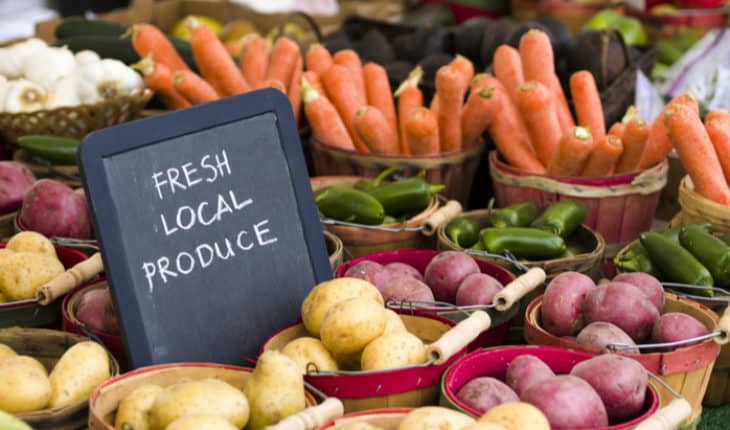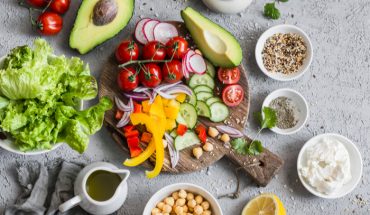For many people a visit to their local farmers’ market, which have remained open during lockdown remains one of the highlights of their week. In contrast to the silent, bored-looking queues for supermarkets, farmers’ markets provide a place you can ask British farmers about their produce and growing methods and chat to other locals. Summer is traditionally a time when our farmers, growers and fishermen produce the best of what they have. Nature has patterns that even a global pandemic hasn’t stopped. You may not be able to eat out right now, but you can still make the best of the season’s wondrous bounty of things to eat and support farmers, growers and fishermen around the UK, as well as improving your cooking skills.
Leafy greens
Including sufficient vitamin C in your diet helps boost your immune system, ward off illnesses and decrease the durations of colds. The summer months are abundant for British vegetables so try to include as many leafy greens and nutrient rich vegetables in your diet as possible to ensure you are getting enough zinc and magnesium. If you are quick you can catch the last of the asparagus, while spinach, salad, cucumber, beetroot, tomatoes and radishes are at their best. Salad with tomatoes, sliced red peppers with sardines, cheese or boiled egg are ideal and nutritious foods for the warmer season, as well as being delicious. If the weather holds up, you can enjoy a socially-distanced picnic in your garden, or terrace. Punnets of strawberries, cherries and gooseberries look fresh and appetising at farmers’ markets, unlike over-handled, over-packaged lack-lustre supermarket fruit.
Seasonal fish and shellfish
At the moment lobster and crab, are coming back into season and mackerel, bass and silver mullet caught off our shores in June, July and August. Easy to cook, they are high in nutritional protein and packed with vitamins and minerals. Seabass is rich in vitamin B12 and selenium, crab is high in vitamin B12 and vitamin E and oily mackerel is packed with omega-3 fatty acids. Increasing your intake of Omega-3 fatty acids by eating more fish helps lower depression by around 17 per cent. Other fish to look out for are smoked salmon and sardines, also packed with beneficial fatty acids and immunity boosting vitamins. Snack in between meals on serotonin boosting nuts and dark chocolate which can also help reduce lockdown lethargy.
Cider
One of England’s oldest drinks, cider was long thought to be good for you, as well as lifting your spirits. Scientists have revealed that cider, like red wine has high levels of beneficial antioxidants, due to the superfood qualities that the apples provide. Antioxidants help to reduce the damage caused by compounds called free radicals which can damage your body’s cells. Scientists at Brewing Research international revealed that half a pint of cider provides as many antioxidants as a glass of red wine. Further trials on volunteer cider drinkers at the Institute of Food Research, Norwich, the results of which were published in the scientific Journal of Nutrition, showed that the antioxidants are rapidly absorbed into the bloodstream enhancing the health benefit. August, September and October are the best time to harvest apples to make cider, which is gaining popularity around the country with many small artisan producers and micro-breweries. Because it’s made from apples, cider is naturally gluten-free making it a delicious tipple for people with coeliac disease, or a sensitivity to gluten. Remember to check the bottle you intend to drink to confirm that it is indeed wheat-free. Cider is usually made from apples, but it can also be made from other fruits including pears, plums, peaches, cherries and strawberries. Unlike beer, you can store a really good cider for a year or two and some will improve with age. Cider is best enjoyed at room temperature, but many people prefer to drink it cold. Half a pint of cider is equivalent to around one unit of alcohol – so savour it!
Oysters
Every July, Whitstable celebrates its famous oysters with an ancient tradition – the Landing of the Oysters, on East Quay Beach, when delicious oysters are brought ashore and blessed by clergy. These bivalves are then carried along by a procession and serenaded with music. The ancient ceremony takes place when native oysters are out of season (the season begins on 1st September), because tradition dictates that the ceremony coincides with the oyster dredgers’ holiday, on St James’s Day (25 July). James Green, the Director of the Whitstable Oyster Fishery Company says, “Whitstable is world famous for oysters and people come as far afield as China, and America especially for our oysters. It is important to people to know that their shellfish have been sustainably farmed and grown in a manner that benefits the environment.” Oysters feed on plankton in the water column and each oyster filters about 30 to 50 gallons of water a day. Apart from being environmentally friendly by helping to keep the sea clean and providing many other ecosystem services, they also have many health benefits. Oysters are a good source of iron, zinc and vitamin B 12 which helps to fight depression and packed with protein and immune boosting nutrients and minerals including copper, vitamin B12, iron, iodine and vitamin D. These shellfish contain nearly fifty times the amount of zinc that is found in chicken. Zinc boosts energy levels and helps process the carbohydrate, fat and protein in the food we eat and helps the healing of wounds. All it takes is three oysters to get more than 100% of your RDA of zinc. They also contain a protein that’s rich in the amino acid tyrosine which helps brain function. Oysters are low in fat in calories and ideal for dieters. They are also a wonderful source of the Omega-3 fatty acid.
- People’s Choice Victory for Down’s Syndrome Scotland Garden at Chelsea 2025 - 28th May 2025
- Cadogan: A Chelsea Family By Tamsin Perrett - 3rd May 2025
- Dream Worlds a new exhibition in Cambridge - 14th December 2024







